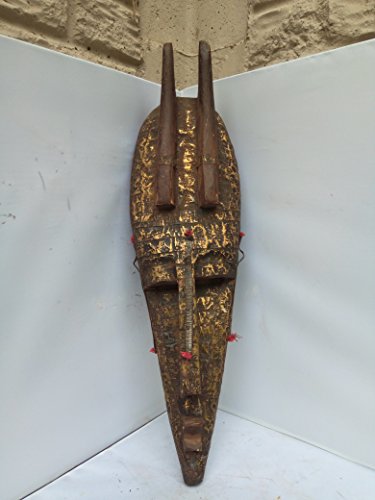Antique Bambara Mask from Mali West Africa 22x6 in
The Bambara is the largest ethnic group in Mali, West Africa. Their traditions include six male societies, each with its own type of mask. Initiation for men lasts for seven years and ends with their symbolic death and their rebirth. Nearly every Bambara man had to pass through these societies in succession, until, upon reaching the highest rank, he had acquired a comprehensive knowledge of ancestral traditions. Those societies are the Jo, the ntomo, the korè , the Komo, and the tji wara. For example, the tji wara society members use a headdress representing, in the form of an antelope, the mythical being who taught men how to farm. The word tji means “work” and wara means “animal,” thus “working animal.” There are antelopes with vertical or horizontal direction of the horns. In the past the purpose of the tji wara association was to encourage cooperation among all members of the community to ensure a successful crop. In recent time, however, the Bambara concept of tji wara has become associated with the notion of good farmer, and the tji wara masqueraders are regarded as a farming beast. The Bambara sponsor farming contests where the tji wara masqueraders perform. Always performing together in a male and female pair, the coupling of the antelope masqueraders speaks of fertility and agricultural abundance. According to one interpretation, the male antelope represents the sun and the female the earth. The antelope imagery of the carved headdress was inspired by a Bambara myth that recounts the story of a mythical beast (half antelope and half human) who introduced agriculture to the Bambara people. The dance performed by the masqueraders mimes the movements of the antelope. Antelope headdress in the vertical style, found in eastern Bambara territory, have a pair of upright horns.

